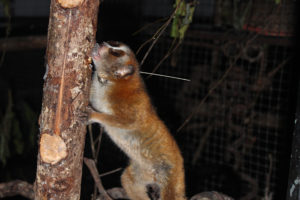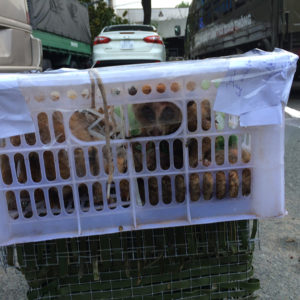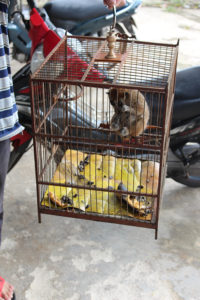The Endangered Asian Species Trust founded in 2007 (UK charity 1115350) established the Dao Tien Endangered Primate Species Centre, in Cat Tien National Park South Vietnam. The centre in direct collaboration with the Forestry Department of Vietnam focusses on endangered primates found in the illegal wildlife trade in the South of Vietnam.
When Dao Tien opened its doors golden-cheeked gibbons (Nomascus gabriellae) and black-shanked doucs (Pygathrix nigripes) flooded in from the illegal tourism and pet trade. At that time in 2008 only one or two pygmy lorises (Nycticebus pygmaeus) were confiscated. With the support of Veterinarian Uli Streicher who introduced EAST to the world of lorises we started radio-collaring and returning these few individual pygmy loris back to the forest. Each individual is important, so every pygmy loris released was radio-collared and monitored post-release. Sadly in the early days many died from predation, but in recent years with a refined protocol we have excellent survival rates. We have also worked hard on captive husbandry and diets, especially providing gum diets for the captive lorises in preparation for return to the wild.
More recently however, the numbers of confiscated pygmy lorises have significantly increased. Pygmy lorises confiscated and donated from long term pets, rich and poor families. But mostly pygmy lorises in the hands of hunters or traders confiscated by the Forestry Protection Department being traded in major towns such as Dalat, Nha Trang or Ho Chi Minh City. Confiscation data from Environmental Police indicates heavy hunting from the central highlands, triggered by new road developments. The roads providing greater access for hunters.
Our research suggests that the demand for pygmy lorises within Vietnam is not great, with reports how they are not good pets, not lively enough. Vietnam with a strong culture of song birds, like to keep beautiful wildlife in small bird cages. For the nocturnal loris hiding from the light, with no beautiful song, just an odd high pitch whistle in distress, hiss and growl, they are not highly desired – Yet!

The only good thing that arises from this “song bird culture” is that the lorises in the south are not having their teeth pulled like in other regions. The pygmy lorises are in general little handled, so reports of negative reactions to the toxic bite are few and far between. At Dao Tien however we can report that the bite from a captive pygmy loris is very strong, triggering extreme anaphylactic shock in some humans. One of many reasons why they should never be considered as a pet.
The fear now in Vietnam is that with greater hunting access more pygmy lorises and other endangered wildlife are being dumped in the large cities which may trigger a behaviour change and a demand for lorises as pets. Now more than ever the awareness about loris conservation is vital, alongside capacity building within and around protected areas.
- Marina Kenyon – Vice Director
- http://www.go-east.org


